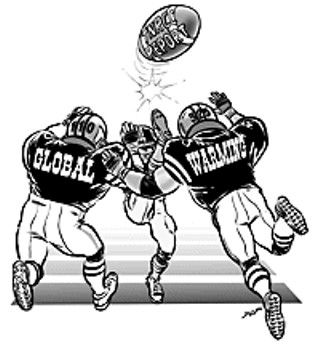Baby It's Warm Outside
Critics say TNRCC sees pollution problems but won't do anything about it.
By Lee Nichols, Fri., Feb. 1, 2002

In previous years, critics of the Texas Natural Resource Conservation Commission have accused the agency of harboring a "hear no evil, see no evil" attitude toward pollution problems, especially those caused by industry. This month, the TNRCC issued a report on greenhouse gas emissions in Texas, and those same critics -- including local and state environmental organizations -- say the regulatory agency now admits it sees and hears the evil, but has decided it won't do a damn thing about it.
Compiled by agency staff and approved on Jan. 18 by the commissioners, the TNRCC report originated last August, when a coalition of state environmental groups known as the "Cool Texas Network" legally petitioned the agency to study global warming emissions. In response, the commissioners ordered staff to collect data on Texas' greenhouse gas emissions, consult with government and academic bodies on how to reduce them, and recommend appropriate action.
The agency's results exhibit a familiar squishiness, with many suggestions to "encourage" this and "promote" that (but never "require" anything). The report does incorporate several studies that predict potentially devastating consequences for the Gulf Coast due to global warming, and its data shows that emissions levels are rising. But the closest TNRCC comes to a concrete recommendation is to create a "voluntary" registry for reporting greenhouse gas emissions reductions. The word "voluntary" unfortunately echoes the commission's recently futile attempts to reduce toxic air emissions from facilities that had been "grandfathered" out of having to comply with state clean air laws. In a report to the Legislature last year, the agency effectively admitted that the voluntary approach had failed.
"The quick and dirty is, TNRCC punted on global warming," said Tim Morstad, Global Warming Project director of Public Citizen's Texas office. "We're disappointed. The first half of the report, for the first time, shows that Texas leads the nation in the gases that lead to global warming. However, in the recommendations, they didn't see any reason to come up with any reduction strategies or policies. We really think TNRCC dropped the ball here."
Lynn Weber, one of the TNRCC analysts who drafted the report, responds that the agency intended its report to serve as a basic document to help the commission make decisions, not as a measurement of current programs' success. He agrees that Texas leads the nation in emissions volumes, but rebuts the importance of that ranking. "Does Texas have a significant number of greenhouse gas emissions?" Weber asks. "Quantity-wise, we'd say, sure, because we're a large industrial state. We have a large population. We have a large number of vehicles that people drive. We are increasing in population. So we make up a significant portion of the greenhouse gases that are emitted from man-made sources in the United States."
The reason why Texas produces around 10% of all man-made gases in the U.S., Weber adds, is that Texas supplies the energy needs for much of the rest of the country. With ample gasoline sources, 40 petroleum refineries, and enough natural gas to ship to many other states in the union, he said, "I would think that it's not unrealistic to believe that Texas would have a significant quantity of greenhouse gas emissions." Asked what role industry played in the formulations of the recommendation, Weber responded, "Limited. ... No substantial input," outside of being consulted as a stakeholder, as per commission directions.
In setting no hard and fast goals, however, the TNRCC's message is, "'We're doing enough already to address the problem of global warming with our existing programs,'" said Morstad. "They had the opportunity to go ahead and quantify how they're addressing global warming, and they could have done some relatively easy calculations to show [this], but they didn't offer us any numbers."
Morstad said "the issue of global warming in Texas will now proceed to the next level," meaning that the Cool Texas Network may now look to Gov. Rick Perry's office for change. The network advocates a mandatory, goal-oriented approach such as that implemented in New York in 1990, by executive order from Governor George Pataki. Meanwhile, a recent Dallas Morning News article reported that the recommendation to make the emissions inventory "voluntary" originally came from Perry's office. Public Citizen Director Tom "Smitty-- Smith told the Morning News "the agency got less interested" in mandatory inventories after Perry's request. The governor's office claimed that Perry's office only requested that the report be based on "sound science."
Got something to say on the subject? Send a letter to the editor.








